2019-2020学年高中英语人教版必修三Unit4单元教案
2019-2020学年高中英语人教版必修三Unit4单元导学案

2019-2020学年高中英语人教版必修三Unit4单元导学案2019-2020学年高中英语人教版必修三Unit4 Astronomy:the science of the stars(warming up and reading) Goals1.to enable the students to talk about Astronomy and origin of life on earth.2.to improve the students’ reading ablities of scanning and skimming-Lead-in questions to the topic of this unit1. In our solar system eight planets circle around the sun What are their names?2.Do you know any questions that astronomers are interested in?Pre-reading1.The origin of life on earth is a question that interests astronomers. What do you know about it?2.There are several ideas about the origin of life on earth and the idea in our passage is only one of them .ReadingI. Read the passage carefully and match the main idea with each paragraph. Para. 1 The formation(形成) of the earth.Para. 2 The importance of water for life.Para. 3 A widely accepted theory about the formation of the universe. Para. 4 The arrival of humans and their impact on the earth.Para. 5 The development of plants and animals on the earth.1.What are the three fundamental elements forus human beings to survive on the earth?Why was the earth different from other planets?3.Why do scientists think there has never been life on the moon?4.Why did green plants help life to develop?5.There used to be nine planets in the solar system. Recently scientists have decided that one of them can no longer be considered a planet. Do you know the name of that planet? Do you know why they removed it?6.What problem is caused by human beings?Post-readingWork in groups and discuss what impact human beings have on earth.,such as global warming.and get them to talk about the causes of global warming.Unit4 language pointsGoals1.to master the following words and expressions:in time;unlike;multiply;inturn;prevent…from;exist;puzzle;atmosphere; now that.2.to enable the students to analyse and understand complex sentences especiallynoun clauses观察in time的用法并总结They were in time to produce the water..( ).I’ll see him in time.( )She will be back in time to prepare dinner.( )与time相关的短语:in no time( ) at times( ) at a time ( ) once upon a time ( )on time ( ) at one time ( ) for the time being from time to time ( )at no time ( )阅读下面句子, 注意prevent ... from的意思和用法。
人教版高一英语必修3unit4教案
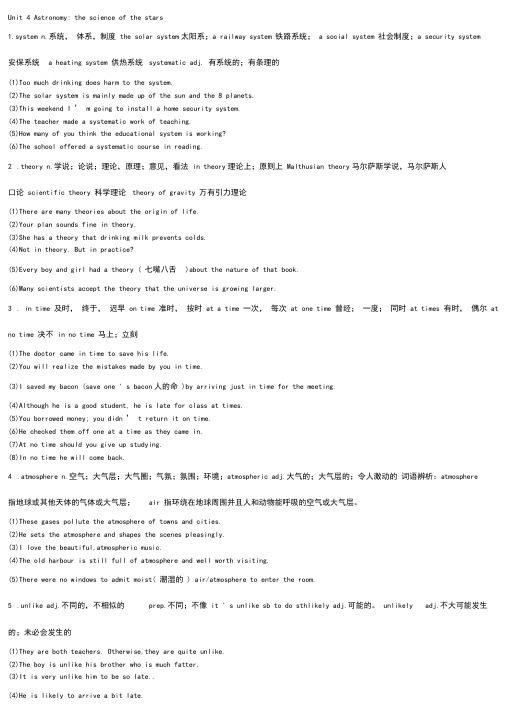
Unit 4 Astronomy: the science of the stars1.system n.系统,体系,制度the solar system太阳系;a railway system 铁路系统; a social system 社会制度;a security system安保系统 a heating system 供热系统systematic adj. 有系统的;有条理的(1)Too much drinking does harm to the system.(2)The solar system is mainly made up of the sun and the 8 planets.(3)This weekend I ’ m going to install a home security system.(4)The teacher made a systematic work of teaching.(5)How many of you think the educational system is working?(6)The school offered a systematic course in reading.2.theory n.学说;论说;理论,原理;意见,看法in theory理论上;原则上Malthusian theory马尔萨斯学说,马尔萨斯人口论scientific theory 科学理论theory of gravity 万有引力理论(1)There are many theories about the origin of life.(2)Your plan sounds fine in theory.(3)She has a theory that drinking milk prevents colds.(4)Not in theory. But in practice?(5)Every boy and girl had a theory ( 七嘴八舌)about the nature of that book.(6)Many scientists accept the theory that the universe is growing larger.3. in time 及时,终于,迟早on time 准时,按时at a time 一次,每次at one time 曾经;一度;同时at times 有时,偶尔at no time 决不in no time 马上;立刻(1)The doctor came in time to save his life.(2)You will realize the mistakes made by you in time.(3)I saved my bacon (save one ' s bacon人的命)by arriving just in time for the meeting.(4)Although he is a good student, he is late for class at times.(5)You borrowed money; you didn ’ t return it on time.(6)He checked them off one at a time as they came in.(7)At no time should you give up studying.(8)In no time he will come back.4.atmosphere n.空气;大气层;大气圈;气氛;氛围;环境;atmospheric adj.大气的;大气层的;令人激动的词语辨析:atmosphere指地球或其他天体的气体或大气层;air 指环绕在地球周围并且人和动物能呼吸的空气或大气层。
2019-2020学年高中英语人教版必修三 Unit4写作课教案

2019-2020学年高中英语人教版必修三Unit 4 Astronomy: the science of the starsTeaching goals 教学目标1 Target language目标语言a重点词汇和短语explore, characteristicsb重点句子Write a short article explaining three problems you might meet on the moon..You may ask the following questions as well as work out some more.2 Ability goals 能力目标Enable the Ss to write an article about your idea or hopes for traveling in space.3 Learning ability goals 学能目标Help the Ss to learn how to write a passage.Teaching important& difficult points教学重点和教学难点Teach the Ss how to write an article about a space travel.Teaching methods教学方法Task-based learningDiscussion.Teaching aids教具准备a projector, a computerTeaching procedures & ways教学过程与方式Step I WritingThe purpose of this writing is for students to think about what kind of equipment they would need to be safe in space. It’s a good opportunity for a discussion about the pains and pleasures that might occur when traveling in space. After the discussion, they can write down the problems and the way to solve them.T: If you are going off on a holiday, what will you take?S1: I will take clothes, shoes, food and many other things.T: But for space travel, you need specialized equipment. What equipment should you take? We have discussed them in last lesson. Who can answer this question?S2: oxygen can, spacesuit, gravity boots, water system, special food., special ropes, space buggy, sunglasses and space camera.T: We take so many things with us in order to avoid many dangers. What are the dangers? If you do n’t know many enough, let’s watch the film “Apollo”. It’s a film about an American space mission that went wrong. After that, you should write down the dangers and the way to solve them.(Watch the film.)Sample article:If I visited the moon, I might have three problems: how to breathe, how to eat and how to move around.I would have to carry all my air with me if I went to the moon. This is because the moon has no air of its own. So I would need oxygen tanks placed on my back so I could breathe all the time.I would have to take all my food with me if I went to the moon. In the spaceship, there is no gravity so the food would float around. So, I would make sure that it is specially made as space food and then I would be able to eat it easily.I would find it difficult to move around on the moon as I would weigh one-sixth what I weigh on the earth. This means I would bounce like a balloon if I try to walk. I would have to learn to walk differently so that I don’t fall over.If I follow this advice, I think I will have a good holiday on the moon.Step II Writing TaskThe purpose of this writing task is for the students to use the information they have gathered on astronomy and their questions to each other to write an interesting and lively newspaper article. T: Have you ever remembered Oct.16th, 2003?S: Yes, of course..T: What happened on that day?S: China’s first manned spaceship landed safely that day.T: It’s a great moment for China and the whole world. How many preparations have they made for this space travel?S: Not exactly. But they must have made full preparations for this manned space flight.T: Do you admire Yang Liwei?S: He is our hero.T: Do you want to be a great man like him?S: Of course, I’m dreaming of that.T: You’ll get the chance if you work hard.. China has other new plans. The scientists plan to put a lab into space manned by scientists for short periods. They aim to visit the moon to look for valuable resources there as well as to study its environment and geological structures. Do you want to be that lucky scientist? Suppose you are the scientist who visits the moon in the future, please tell us your plan. For example, you can think about these questions and write down your plan.1.What preparations should you make?2.What will you see during your space travel?3.What will you do on the moon?Show sample article:Going into spaceCarry out research on the moonI’ll visit moon soon. As a scientist, I have always wanted to visit it by myself. But it’s not an easy thing. So I should make many preparations. First I’ll take enough exercise in order to be strong. Then I’ll take enough and necessary equipment with me. I will make notes of what I’ll see on the moon because we’ll put a lab on it. Through experiments in the lab, we’ll collect va luable resources and study its environment and geological structures.We’ll also want to find out if it’s a good place for humans to live in in the future. I believe I’ll get what I want to get from the moon. (Teacher can supply other information for students. Show the following on the screen:)China’s manned space programme has four goals:1.to develop basic manned space flight technology;2. to observe the earth and undertake experiments in space;3. to help design space vehicles;4. to accumulate experience for a large space stationT: Suppose you are part of this future programme, talk about what you’ll do, what you’ll see and what you’ll get.Step III ProjectAsk students to collect as much information as they can about the nine planets in our solar system. Choose one planet that they would like to explore. Then write a research report. The report should include the four requirements on Page68.1.One possible project:Topic: MarsThe planet I have chosen is Mars because it’s the closest to the earth and it’ll be one of the first planets for us to explore. It’s named after the Roman god of war because from the earth it looks red in the sky.InformationPosition: 4th planet in our solar systemDistance from our sun: 228 million kmsDiameter: half the size of the EarthMass: one tenth the size of EarthGravity: one third of that of EarthSurface size: same as dry land of EarthLength of day: half an hour longer than Earth dayTime to circle the sun: two Earth yearsSatellites: twoAir: 95% carbon dioxide 2% argon, 3% nitrogen, very little oxygenFindings from space tripsThe most important trips to Mars have been made by the US and USSR. They have both sent many spaceships but no people to visit Mars. They have discovered:---there are two seasons on Mars: a warm, dusty, southern summer and cold, dusty-free northern winter.---no life can live on Mars now, as the air doesn’t have enough oxygen---there are some evidence of early life when there was water on Mars three million years ago---changes in the color of Mars are produced by dust storms on Mars---it has a north and a south pole made of frozen carbon dioxide gasWhat I would like to find out1.whether there is life under the surface of Mars2.whether it would be possible for people to live on Mars3.whether there is oil or jewels or rocks that would be useful for people on Earth2.Another project:Topic: JupiterJupiter is the fifth planet from the Sun and is the largest one in the solar system. If Jupiter were hollow, more than one thousand Earths could fit inside. It also contains more matter than all of the other planets combined. It has a mass of 1.9 x 1027 kg and is 142,800 kilometers (88,736 miles) across the equator. Jupiter possesses 28 known satellites, four of which - Callisto, Europa, Ganymede and Io - were observed by Galileo as long ago as 1610. Another 12 satellites have beenrecently discovered and given provisional designators until they are officially confirmed and named.InformationJupiter StatisticsMass (kg) 1.900e+27Mass (Earth = 1) 3.1794e+02Equatorial radius (km) 71,492Equatorial radius (Earth = 1) 1.1209e+01Mean density (gm/cm^3) 1.33Mean distance from the Sun (km) 778,330,000Mean distance from the Sun (Earth = 1) 5.2028Rotational period (days) 0.41354Orbital period (days) 4332.71Mean orbital velocity (km/sec) 13.07Orbital eccentricity 0.0483Tilt of axis (degrees) 3.13Orbital inclination (degrees) 1.308Equatorial surface gravity (m/sec^2) 22.88Equatorial escape velocity (km/sec) 59.56Visual geometric albedo 0.52Magnitude (Vo) -2.70Mean cloud temperature -121°CAtmospheric pressure (bars) 0.7Atmospheric compositionHydrogen Helium 90% 10%Findings from space trips1.There is a ring system, but it is very faint and is totally invisible from the Earth. (The rings were discovered in 1979 by Voyager 1.)2.The atmosphere is very deep, perhaps comprising the whole planet, and is somewhat like the Sun. It is composed mainly of hydrogen and helium, with small amounts of methane, ammonia, water vapor and other compounds.3. At great depths within Jupiter, the pressure is so great that the hydrogen atoms are broken up and the electrons are freed so that the resulting atoms consist of bare protons. This produces a state in which the hydrogen becomes metallic.4. Colorful latitudinal bands, atmospheric clouds and storms illustrate Jupiter's dynamic weather systems. The cloud patterns change within hours or days. The Great Red Spot is a complex storm moving in a counter-clockwise direction.5. Auroral emissions, similar to Earth's northern lights, were observed in the polar regions of Jupiter.What I would like to find out1.whether there is life under the surface of Jupiter2.whether it would be possible for people to live on Jupiter3.whether there is oil or jewels or rocks that would be useful for people on EarthStep V HomeworkSum up the whole unit.Collect the materials about stars, space travel and different ideas about the beginning of life..。
英语 人教必修版 第三册教案 Unit4
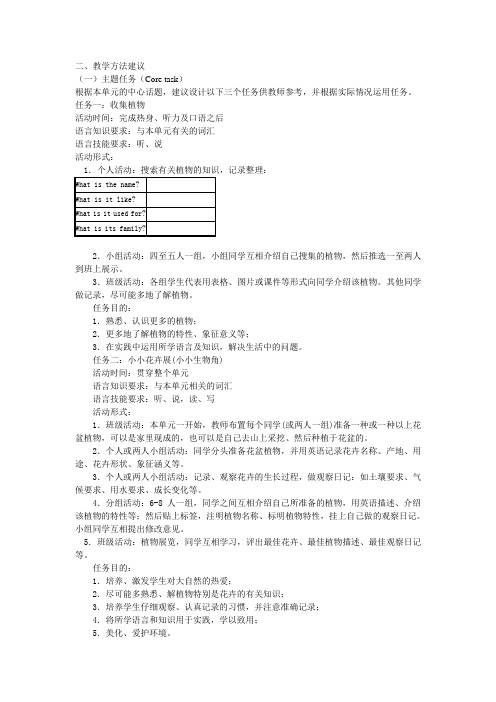
二、教学方法建议(一)主题任务(Core task)根据本单元的中心话题,建议设计以下三个任务供教师参考,并根据实际情况运用任务。
任务一:收集植物活动时间:完成热身、听力及口语之后语言知识要求:与本单元有关的词汇语言技能要求:听、说活动形式:1.个人活动:搜索有关植物的知识,记录整理:2.小组活动:四至五人一组,小组同学互相介绍自己搜集的植物,然后推选一至两人到班上展示。
3.班级活动:各组学生代表用表格、图片或课件等形式向同学介绍该植物。
其他同学做记录,尽可能多地了解植物。
任务目的:1.熟悉、认识更多的植物;2.更多地了解植物的特性、象征意义等;3.在实践中运用所学语言及知识,解决生活中的问题。
任务二:小小花卉展(小小生物角)活动时间:贯穿整个单元语言知识要求:与本单元相关的词汇语言技能要求:听、说,读、写活动形式:1.班级活动:本单元一开始,教师布置每个同学(或两人一组)准备一种或一种以上花盆植物,可以是家里现成的,也可以是自己去山上采挖、然后种植于花盆的。
2.个人或两人小组活动:同学分头准备花盆植物,并用英语记录花卉名称、产地、用途、花卉形状、象征涵义等。
3.个人或两人小组活动:记录、观察花卉的生长过程,做观察日记:如土壤要求、气候要求、用水要求、成长变化等。
4.分组活动:6-8人一组,同学之间互相介绍自己所准备的植物,用英语描述、介绍该植物的特性等;然后贴上标签,注明植物名称、标明植物特性,挂上自己做的观察日记。
小组同学互相提出修改意见。
5.班级活动:植物展览,同学互相学习,评出最佳花卉、最佳植物描述、最佳观察日记等。
任务目的:1.培养、激发学生对大自然的热爱;2.尽可能多熟悉、解植物特别是花卉的有关知识;3.培养学生仔细观察、认真记录的习惯,并注意准确记录;4.将所学语言和知识用于实践,学以致用;5.美化、爱护环境。
任务三:生物科学家论坛活动时间:学完“读前”、“阅读”、“读后”、“综合技能”之后语言知识要求:本单元有关词汇语言技能要求:读、写、说、听活动形式:1小组活动:以4-6人为一小组,讨论确定将要介绍的生物科学家。
人教版英语必修三Unit4(Reading)教学教案
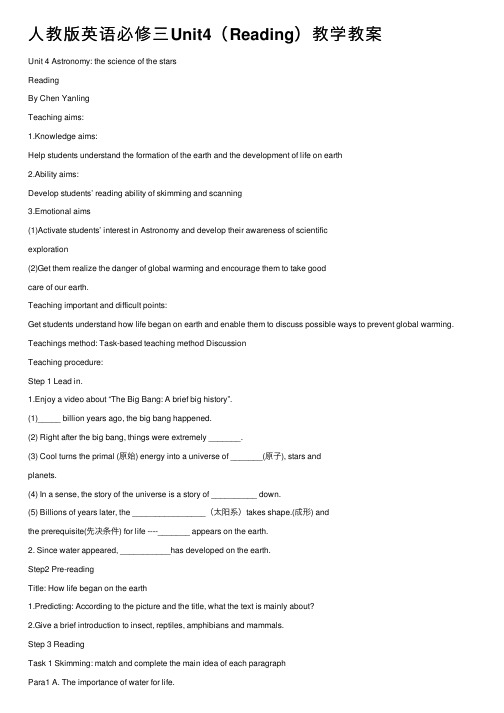
⼈教版英语必修三Unit4(Reading)教学教案Unit 4 Astronomy: the science of the starsReadingBy Chen YanlingTeaching aims:1.Knowledge aims:Help students understand the formation of the earth and the development of life on earth2.Ability aims:Develop students’ reading ability of skimming and scanning3.Emotional aims(1)Activate students’ interest in Astronomy and develop their awareness of scientificexploration(2)Get them realize the danger of global warming and encourage them to take goodcare of our earth.Teaching important and difficult points:Get students understand how life began on earth and enable them to discuss possible ways to prevent global warming. Teachings method: Task-based teaching method DiscussionTeaching procedure:Step 1 Lead in.1.Enjoy a video about “The Big Bang: A brief big history”.(1)_____ billion years ago, the big bang happened.(2) Right after the big bang, things were extremely _______.(3) Cool turns the primal (原始) energy into a universe of _______(原⼦), stars andplanets.(4) In a sense, the story of the universe is a story of __________ down.(5) Billions of years later, the ________________(太阳系)takes shape.(成形) andthe prerequisite(先决条件) for life ----_______ appears on the earth.2. Since water appeared, ___________has developed on the earth.Step2 Pre-readingTitle: How life began on the earth1.Predicting: According to the picture and the title, what the text is mainly about?2.Give a brief introduction to insect, reptiles, amphibians and mammals.Step 3 ReadingTask 1 Skimming: match and complete the main idea of each paragraphPara1 A. The importance of water for life.Para2 B. The formation(形成) of the earthPara3 C. It is widely accepted that the universe began with a “Big Bang”Para4 D. The evolution of plants and animals on the earth.Para5 E.The arrival of and their effects on the earth.Task 2 Scanning1. How life began on the earth2. Find out the development of plants and animals according to the time theyappeared on earth.Task3 Group discussion1. What problem is caused by human beings? Why?Problem: The earth may become ________________________Reason: Because we human beings are putting too much __________________intothe atmosphere, heat is prevented from_____________________________________As students, what can we do to prevent the earth from becoming hotter andhotter?模板There are a lot we students can do to prevent the earth from becoming hotter andhotter.To begin with, we can . Inaddition, it would be a good idea if we .What’s more important is that we are supposed to Task 4 Game (Make a choice)1. It exploded loudly with fire and rock. They were in time to produce carbon dioxide,nitrogen, water vapour and …. What does the word “They” refer to?As the earth cooled down Between 4.5 and 3.8 billion years ago Many millions of years later Several billion years laterA.PlanetsB. StarsC. GasesD. Fire and rock2. According to the 2nd paragraph, the atmosphere is formed by all the following except .A. CO2B. N?C. H2O(g)D. rock and fire3. T/F (1) Water has only appeared on the earth.(2) Mammals produced young by laying eggs4Translate the words in Chinese.(1)It was not immediately obvious that water was to be fundamental to the development of life.(2)Others, called amphibians, were able to live on land as well as in the water. 5From the last paragraph we can infer that the author isA.confidentB. sadC. concernedD. angryStep 4 Homework (writing)写作内容:请以约120词谈谈你对global warming 的看法,要点如下:1.造成⽓候变暖的原因2.⽓候变暖可能带来的后果3.如何防⽌⽓候变暖4.。
2019-2020年新人教版高中英语必修三unit4《astronomythescienceofthestars》全单元教案.doc

Unit 4 Astronomy the science of the stars I.单元教学目标s as the subject.III.教材分析与教材重组1. 教材分析本单元以astronomy the science of the stars, the development of life, space travel and gravity为话题,通过本单元的几篇阅读材料使学生对以上问题有所了解,并通过文章中的一些探讨性的问题,比如,The earth may bee too hot for the lives on it. Then what will our future be? 使学生更好地了解我们的地球和我们的生活环境,并引发对“地球的将来如何”的热烈讨论,通过这些讨论激发学生对天文学了解和探究的强烈兴趣。
通过讨论登月球需要的物品和可能遇到的困难学会提出问题和解决问题的表达方法,并能就此写出一篇表达合理思路清晰的短文。
1.1 WARMING UP以讨论的形式通过三组问题引导学生讨论边缘科学,讨论科学的方法以及要成为真正的科学家所必须掌握的技能。
1.2 PRE-READING 主要让学生弄清楚什么是科学思想,什么是宗教信仰或文化传统。
在探讨生命起源的科学道理之前,让学生以听故事或讲故事的方式,交流有关宇宙的起源的种种传说,既有趣味性,又能调动学生的相关知识,激活学生的思维。
1.3 READING 讲述了地球上生命的起源。
水的形成使得地球有别于其他星球,它使得地球上生命的诞生成为可能。
科学家认为,地球上的生命首先诞生于水中,上百万年后,陆地上才长出绿色植物,随后出现了陆栖动物和水陆两栖动物。
最初的动物靠孵化繁衍后代,后来出现了哺乳动物,人类也随之诞生了。
文章最后讲了令人深省的问题:The earth may bee too hot fo r the lives on it.1.4 PREHENDING通过四个选择填空题检测学生对本文核心问题的理解:地球上生命的起源和延续需要哪些条件?随后通过排序的方式帮助学生弄清本文的行文线索,也就是地球上生命的起源和发展历程。
人教版高中英语必修三教案:unit4 Grammar practice
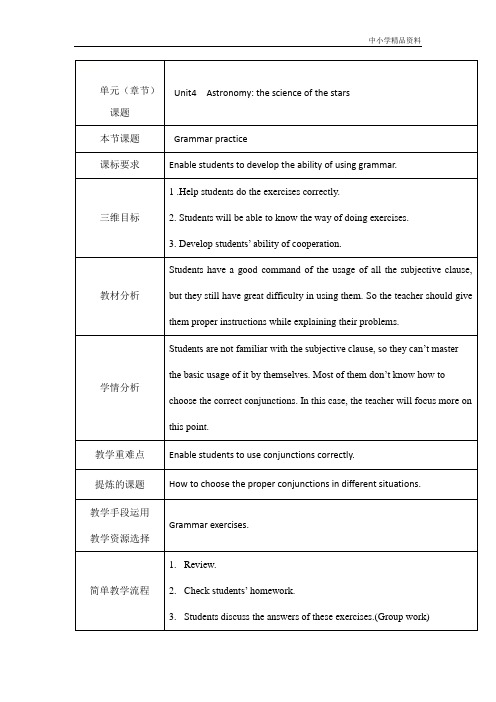
单元(章节)课题Unit4 Astronomy: the science of the stars本节课题Grammar practice课标要求Enable students to develop the ability of using grammar.三维目标1 .Help students do the exercises correctly.2. Students will be able to know the way of doing exercises.3. Develop students’ ability of cooperation.教材分析Students have a good command of the usage of all the subjective clause, but they still have great difficulty in using them. So the teacher should give them proper instructions while explaining their problems.学情分析Students are not familiar with the subjective clause, so they can’t master the basic usage of it by themselves. Most of them don’t know how to choose the correct conjunctions. In this case, the teacher will focus more on this point.教学重难点Enable students to use conjunctions correctly.提炼的课题How to choose the proper conjunctions in different situations. 教学手段运用教学资源选择Grammar exercises.简单教学流程1.Review.2.Check students’ homework.3.Students discuss the answers of these exercises.(Group work)。
2019-2020学年高中英语人教版必修三Unit4 Reading学案及答案
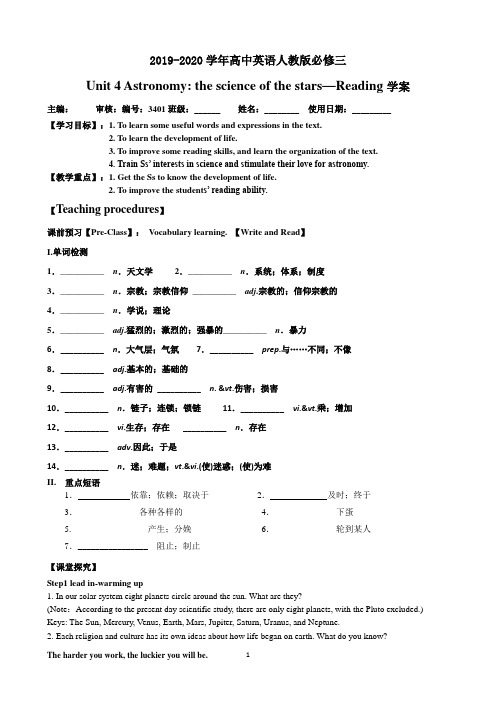
2019-2020学年高中英语人教版必修三Unit 4 Astronomy: the science of the stars—Reading学案主编:审核:编号:3401班级:______ 姓名:________ 使用日期:_________【学习目标】:1. To learn some useful words and expressions in the text.2. To learn the development of life.3. To improve some reading skills, and learn the organization of the text.4. Train Ss’ interests in science and stimulate their love for astronomy.【教学重点】:1. Get the Ss to know the development of life.2. To improve the student s’ reading ability.【Teaching procedures】课前预习【Pre-Class】:Vocabulary learning. 【Write and Read】I.单词检测1.__________ n.天文学2.__________ n.系统;体系;制度3.__________ n.宗教;宗教信仰__________ adj.宗教的;信仰宗教的4.__________ n.学说;理论5.__________ adj.猛烈的;激烈的;强暴的__________ n.暴力6.__________ n.大气层;气氛7.__________ prep.与……不同;不像8.__________ adj.基本的;基础的9.__________ adj.有害的__________ n. &vt.伤害;损害10.__________ n.链子;连锁;锁链11.__________ vi.&vt.乘;增加12.__________ vi.生存;存在__________ n.存在13.__________ adv.因此;于是14.__________ n.迷;难题;vt.&vi.(使)迷惑;(使)为难II. 重点短语1.____________依靠;依赖;取决于2.___________ 及时;终于3.____________ 各种各样的4._____________ 下蛋5. ________________ 产生;分娩6._____________ 轮到某人7.________________ 阻止;制止【课堂探究】Step1 lead in-warming up1. In our solar system eight planets circle around the sun. What are they?(Note:According to the present day scientific study, there are only eight planets, with the Pluto excluded.) Keys: The Sun, Mercury, Venus, Earth, Mars, Jupiter, Saturn, Uranus, and Neptune.2. Each religion and culture has its own ideas about how life began on earth. What do you know?Step2 Pre-reading1.The origin of life on earth is a question that interests astronomers. What do you know about the scientific theory on the earth?2. Read the title and predict what the reading will be about, then check if you are right.Step3 Reading ComprehendingI. Skimming-Skim the passage and match the main idea with each paragraph.Para. 1 _____ A.The formation(形成) of the earth.Para. 2 _____ B.The importance of water for life.Para. 3 ______ C.A widely accepted theory about the formation of the universe.Para. 4 ______ D.The arrival of humans and their impact on the earth.Para. 5 _______ E.The development of plants and animals on the earth.Ⅱ. True(T) or False(F).1.It was not until between 4. 5 and 3. 8 billion years ago that people knew what the earth was to become. ( ) 2.Water began to appear on the surface of the earth before gases were produced. ( )3.The global warming will have a great effect on human beings. ( )Ⅲ. Choose the best answer according to the text.1.What began to appear on the earth's surface when it cooled down?A.Water. B.Gases. C.Acids.2.From the last paragraph we can infer that the author is ________.A.confident B.sad C.concerned3.What does the word “they” in the sentences “It exploded loudly with fire and rock. They were in time to produce carbon dioxide,nitrogen,water vapour and. . .” refer to?A.Planets. B.Fire and rock. C.Gases.4.Which is the right order of the development of life?A.Small clever animals→shellfish→dinosaurs→mammals.B.Shellfish→dinosaurs→small clever animals→mammals.C.Shellfish→dinosaurs→mammals→small c lever animals.5.Why were mammals different from other life forms?A.Because they gave birth to young baby animals and produced milk to feed them.B.Because they produced young generally by laying eggs.C.Because they were able to live on land as well as in the water.IV. Fill in the blanks according to the text.【课堂巩固练习】Fill in the blanks according to the reading passage.For several billion years after the “Big Bang” ,the earth was just 1._____ cloud of dust. Between 4. 5 and 3. 8 billion years ago,the dust settled into a solid globe. The earth became so violent and it exploded loudly with fire and rock. They were in time 2. __________(produce) many things,which were to make the earth's atmosphere. As the earth cooled down,water began to appear on 3.______ surface. The continued presence of water allowed the earth to dissolve 4.__________ (harm) gases and acids into the oceans and seas. This produced a chain reaction,which made 5._________ possible for life to develop. Many millions of years later,the first extremely small plants multiplied and filled the oceans and seas 6. _________ oxygen. This encouraged the later 7.____________(develop) of early shellfish and all sorts of fish. Finally,some small clever animals,now with hands and feet ,appeared and spread all over the earth. They are putting too much carbon dioxide into the atmosphere, 8. _________ prevents heat from escaping from the earth into space. 9. _______ life will continue on the earth for millions of years to come will depend on whether this problem can 10. ____ ( solve ).Unit 4 Astronomy: the science of the stars—Reading学案参考答案Step1 Vocabulary learningⅠ. 单词检测1.astronomy n.天文学2.system n.系统;体系;制度3.religion n.宗教;宗教信仰religious adj. 宗教的;信仰宗教的4.theory n.学说;理论5.violent adj. 猛烈的;激烈的;强暴的violence n.暴力6.atmosphere n.大气层;气氛7.unlike prep. 与……不同;不像8.fundamental adj. 基本的;基础的9.harmful adj. 有害的harm n. &vt. 伤害;损害10.chain n.链子;连锁;锁链11.multiply vi. &vt. 乘;增加12.exist vi. 生存;存在existence n.存在13.thus adv. 因此;于是14.puzzle n.迷;难题;vt. &vi. (使)迷惑;(使)为难Ⅱ. 短语默写1.depend on依靠;依赖;取决于2.in time及时;终于3.all sorts of各种各样的4.lay eggs下蛋5.give birth to 产生;分娩6.in one's turn 轮到某人7.prevent. . . from 阻止;制止Step3 Reading ComprehendingⅠ. Match the main idea with each paragraph.Para. 1(C) A.The formation(形成) of the earth.Para. 2(A) B.The importance of water for life.Para. 3(B) C.A widely accepted theory about theformation of the universe.Para. 4(E) D.The arrival of humans and their impact on the earth.Para. 5(D) E.The development of plants and animals on the earth.Ⅱ. True(T) or False(F).1.It was not until between 4. 5 and 3. 8 billion years ago that people knew what the earth was to become. (T) 2.Water began to appear on the surface of the earth before gases were produced. (F)3.The global warming will have a great effect on human beings. (T)Ⅲ. Choose the best answer according to the text.1.What began to appear on the earth's surface when it cooled down?A.Water. B.Gases. C.Acids.答案 A2.From the last paragraph we can infer that the author is ________.A.confident B.sad C.concerned答案 C3.What does the word “they” in the sentences “It exploded loudly with fire and rock. They were in time to produce carbon dioxide,nitrogen,water vapour and. . .” refer to?A.Planets. B.Fire and rock. C.Gases.答案 B4.Which is the right order of the development of life?A.Small clever animals→shellfish→dinosaurs→mammals.B.Shellfish→dinosaurs→small clever animals→mammals.C.Shellfish→dinosaurs→mammals→small clever animals.答案 C5.Why were mammals different from other life forms?A.Because they gave birth to young baby animals and produced milk to feed them.B.Because they produced young generally by laying eggs.C.Because they were able to live on land as well as in the water.答案 AIV.Fill in the blanks according to the text.【课堂巩固练习】Fill in the blanks according to the reading passage.For several billion years after the “Big Bang” ,the earth was just 1._____ cloud of dust. Between 4. 5 and 3. 8 billion years ago,the dust settled into a solid globe. The earth became so violent and it exploded loudly with fire and rock. They were in time 2. __________(produce) many things,which were to make the earth's atmosphere. As the earth cooleddown,water began to appear on 3.______ surface. The continued presence of water allowed the earth to dissolve 4.__________ (harm) gases and acids into the oceans and seas. This produced a chain reaction,which made 5._________ possible for life to develop. Many millions of years later,the first extremely small plants multiplied and filled the oceans and seas 6._________ oxygen. This encouraged the later 7.____________(develop) of early shellfish and all sorts of fish. Finally,some small clever animals,now with hands and feet ,appeared and spread all over the earth. They are putting too much carbon dioxide into the atmosphere, 8. _________ prevents heat from escaping from the earth into space. 9. _______ life will continue on the earth for millions of years to come will depend on whether this problem can10.____________( solve ).参考答案:1. a 2. to produce 3. its 4. harmful 5. it 6. with7. development 8. which 9. Whether 10. be solved。
2019-2020学年高中英语人教版必修三unit4全单元导学案
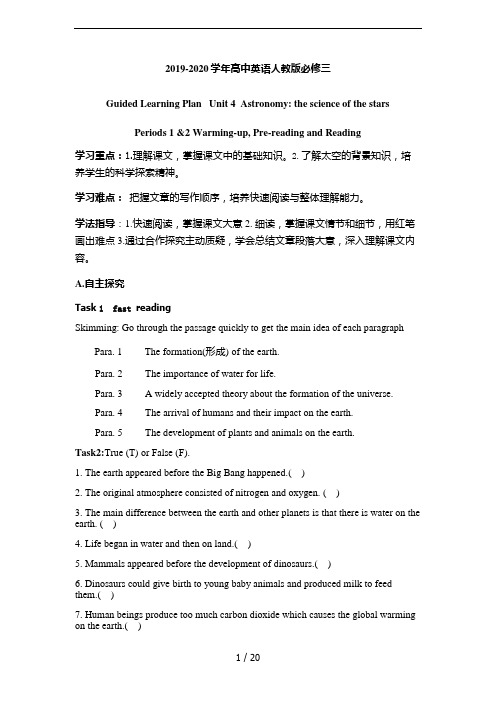
2019-2020学年高中英语人教版必修三Guided Learning Plan Unit 4 Astronomy: the science of the starsPeriods 1 &2 Warming-up, Pre-reading and Reading学习重点:1.理解课文,掌握课文中的基础知识。
2.了解太空的背景知识,培养学生的科学探索精神。
学习难点:把握文章的写作顺序,培养快速阅读与整体理解能力。
学法指导:1.快速阅读,掌握课文大意 2. 细读,掌握课文情节和细节,用红笔画出难点 3.通过合作探究主动质疑,学会总结文章段落大意,深入理解课文内容。
A.自主探究Task 1 fast readingSkimming: Go through the passage quickly to get the main idea of each paragraphPara. 1 The formation(形成) of the earth.Para. 2 The importance of water for life.Para. 3 A widely accepted theory about the formation of the universe.Para. 4 The arrival of humans and their impact on the earth.Para. 5 The development of plants and animals on the earth.Task2:True (T) or False (F).1. The earth appeared before the Big Bang happened.( )2. The original atmosphere consisted of nitrogen and oxygen. ( )3. The main difference between the earth and other planets is that there is water on the earth. ( )4. Life began in water and then on land.( )5. Mammals appeared before the development of dinosaurs.( )6. Dinosaurs could give birth to young baby animals and produced milk to feed them.( )7. Human beings produce too much carbon dioxide which causes the global warming on the earth.( )8. According to the text, human beings would disappear in the end. ( )B.合作探究Careful reading:Task1.Scan for the detailed information and find the part talking about the development of life:a cloud of ______→ a solid ______→presence of ______→ small _____ in water → _______ and all sorts of fish → Green ____ on land → ______ and ______ appear → Plants grew into _______ → _____ (on land) →__________( on land) → __________ (on land) →____________ (small clever animals on land)Task2.Read the passage again and try to finish the answers below.1).Why was the earth different from other planets?2).Why did the plants grow before the animals came?3).Why is it wrong in films and stories to show dinosaurs and people together?4).Why do you think that humans are the cleverest animals on the earth?5).There used to be nine planets in the solar system. Recently scientists have decided that one of them can no longer be considered a planet. Do you know the name of that planet? Do you know why they removed it?6).What problem is caused by human beings?C.反馈测试根据课文完成短文并复述课文The _________of the earth produced water vapour, which turned into water when the earth ________down. Water allowed the earth to ________harmful gases into the oceans and seas. That made it possible for life to begin to develop. The arrival of small________ encouraged the development of early shellfish and all ________of fish. Many millions of years later the first________ plants began to appear on land. Later land animals appeared. Some were insects. At last________ rule the world, but they are not taking _________of the earth very well.D.延伸拓展根据所给首字母或中文意思填写单词。
人教版必修三第四单元教案

Unit 4 Astronomy: the science of the starsHow life began on the earth (reading)Teaching Aims:Knowledge aims: 1. To get Ss to know something new words and structures about the astronomy.2. To grasp the idea of the passage ….Ability aims: 1.To dev elop Ss’ basic skills of speaking and reading. Reading is the focus in this lesson. Reading skills for Ss include (predicting, skimming, scanning and digesting.)2.To retell the story according to the time orderEmotional aims: To develop the students’ responsibility to protect the earth.Lesson type:period 1Lesson time: 45 minutesTeaching important points:1. Let ss. learn some related words ,expressions and structures in this part;2. Improve ss. reading skills (predicting, skimming, scanning, guessing difficult words, topic sentences)3. Help ss. understand the development of the creatures according to the time order Teaching difficult points:To retell the development of the creatures according to the time orderTeaching methods: Task-based teaching and Cooperative learningTeaching Aids: a multi-media computer and a blackboardTeaching Procedure:Step 1. Warming-up & lead-inTask 1 (class work)To show some pictures about eight planets on PPT and get the students to match the pictures with their English names.Task 2 (individually)Brain-storm some topics that are about astronomy. If the students can’t think of much, I will list some of them.Task 3 (group work)To offer some questions about astronomy and get the students to choose what they are the mostinterested in to answer. Then tell the ideas to the group members. The following questions are included.1.How did the universe begin?2.How did the life on the earth begin?3.What is the “black whole”?4.Is there life on other planets besides the earth?5.What happened to all the matter after the “Big Bang”?Step 2. Pre-readingTask 1 to tell the story (class work)To show the pictures about that Nvwa ,God and Darwin, and to get the students to answerQ: Can you tell something about the pictures?Task2 predicting (individually)Read the title of the passage and predict what the passage is about.Step 3. While-readingTask 1(individually) Teaching the new words and structuresStudents are encouraged to preview the text and find out the new words and structures. They should try to work out the meaning of the new words through context. If necessary, they can look up in the dictionary or turn to the teacher for help.Task2 skimming (individually)Ss are required to go through the whole passage quickly to get the general idea and pay special attention to the first or last Para of the article (or the first sentence or the last sentence of each Para.)Task 3 scanning (group work)1.When did the “big bang” happen?2.What form was the earth after the “big bang” ?3.How did water come into being on the earth?4.what made up the earth’s atmosphere after the earth exploded?5.what’s the significance of the presence of water on the earth?6.what was important to the development of fish?7.what made possible the rise of mammals on the earth?8.why are mammals different from all life forms in the past?Task 4 careful reading (group work)Encourage Ss to read the passage again. According to the time order, students are encouraged to exchange their understanding of the passage with their group members and work together to fill in the following form:Step 4. Post-readingTask1 retell (pair work)look at the picture on the page of 26 of the text book and retell the procedure of the development of the creatures.Task2 Discussion (Group work)Reread the sentence “The earth may become too hot to live on” a nd discussWhat can we do to protect the earth?Step 5. HomeworkTask1 consolidate the new words and structures they have learned.Task 2 Encourage Ss to go to the school library or get on the Internet if possible to consult related English websites to search for more information about the origin of life on the earth and find out more evidence to support the theory on the internet.Blackboard-design for this period:TitleHere are some new words for SsHere is the form 1 23 5 46 789。
人教新课标高中英语必修三Unit4_Astronomy全单元详细教案[1]1
![人教新课标高中英语必修三Unit4_Astronomy全单元详细教案[1]1](https://img.taocdn.com/s3/m/cca11907de80d4d8d15a4ff3.png)
Unit 4 Astronomy: thescience of the starsContents 目录一、单元教学目标和要求(Teaching aims and demands)二、教材内容分析(Analysis of the teaching materials)三、单元预习任务(Pre-unit task)四、教学安排(Teaching arrangements)五、教学步骤(Teaching procedures)六、背景参考资料(Background knowledge)七、评价与反思(Assessment and reflection)一、教学目标和要求(Teaching aims and demands)根据《英语新课程标准》(实验稿)关于总目标的具体描述,结合高一学生实际和教材内容,我们将教学目标分为语言知识、语言技能、学习策略、情感态度、文化意识五个方面。
1.语言知识(Knowledge)词汇(Vocabulary):能理解、内化、运用以下生词--atmosphere, violent--violence, solid, explode, oxygen, surface, planet, harmful—harm, development—develop, spread, method, presence, telescope, disappointed, force, gradually, float, mass,短语(Phrases and expressions):the solar system, in time, carbon dioxide, prevent… from, depend on, cheer up, now that, break out,功能(Functions):学习掌握一些用于陈述问题及给予意见的结构,如:My problem/ trouble is……? The difficulty / question is…My advice/ suggestion is…What I think about it is…Please pay attention to…Make sure you …Watch out for…语法(Grammar):掌握和运用主语从句。
人教高中英语必修三第四单元-教学设计
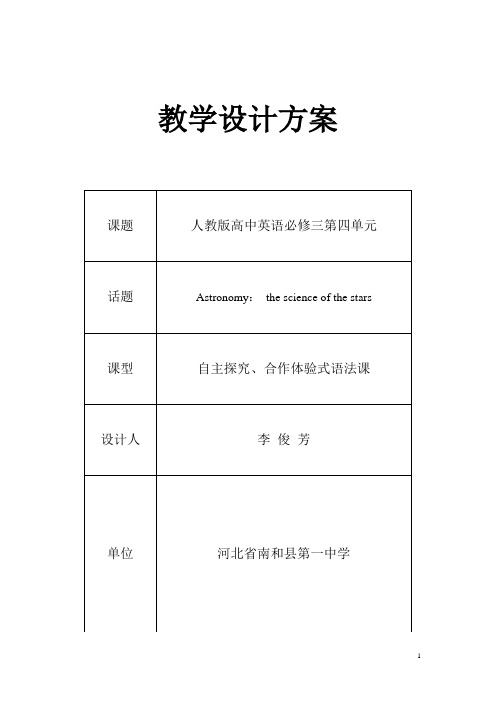
本节内容是语法学习,旨在通过本节语法载体,激励学生体验英语学习之乐,引导学生形成语法学习策略、提高学习能力和语言运用能力。
学 情 分 析
1.学情了解:通过学生访谈和预习观察,了解到学生对语法学习方式有初步认识,但对语法运用和体验还需加强,英语运用能力尚待进一步培养。
2.学生认知发展分析:学生经过半年的高中英语学习,已经初步适应了高中教材,初步形成一些英语思维能力和学习能力,英语运用能力初步形成,但还薄弱,而且对于主语从句的概念和运用还陌生,需要进一步培养。本节课旨在通过该项语法学习,对学生的学习策略进一步引导,继续培养学生的自主探究能力,为学生终身学习能力的培养打下结实的基础.
To encourage students to apply grammar knowledge and experience joy from learning English。
激励学生体验英语语法学习之乐,培养英语语法学习策略
Step6
Summary and assessment(5m)
环节6
总结评价
火眼金睛
发现破绽
Inspire and instruct students to find out the mistakes in the sentences.
激励学生找出句子中的错误
Find out the mistakes using the knowledge learned in the class。
教学设计方案
课题
人教版高中英语必修三第四单元
话题
Astronomy:the science of the stars
课型
自主探究、合作体验式语法课
设计人
人教版2019第三册 高中英语 Unit4 Adversity and Courage单元教案

selfishbad-tempered
hopeful
Improve students' thinking quality.
Activity 3
(After reading)
T shows some difficult sentences of the text on screen and then analyze them to help Ss better understand its usages.
2.… because he thought I wБайду номын сангаасs too young and wasn't qualified.
3.But I was so enthusiastic about the idea of going along with them …
4.He assigned me to be a steward, …
3. Ssread the adand answer the questions:
①Accordingto the advertisement, what kind of men was Shackleton looking for?
②Would you like to join anexpeditionlike this? Why or why not?
1.Understandexpedition and its conditionsbetter viashowing them something about Antarcticaand widen students’ knowledge.
2019-2020 学年高中英语人教版必修三Unit4 Using language导学案

L: We use small engines to move around. To go left we push ____________and to go right we push the right one. We have to go very slowly because we don’t weigh anything in space. We can fly around like feathers.
L: First we had to get into__________. They’re verythickand carry all the _______we need to breathe. The suit also has _____________________so it can warm us if it’s too cold or cool us if it’s too hot. So it’s very heavy.
2019-2020学年高中英语人教版必修三
Unit4Astronomy: of the stars
Using language
1.Skim the passage andanswer the following questions.
1)What’s the main idea of the passage?
time
gravity
weight
when the rocket began to rise into the air
___________(strong/weak)
__________ (light/heavy)
in space
人教_高一英语必修第三册(2019版)_Unit4_单元活动设计参考

Unit4 单元活动设计参考案例一活动方式:Pair Work(P39)活动内容:Ask students to discuss whether they would like to be an astronaut in the future and give their reasons.学情分析:学生在听力活动中,已经获取了成为一名宇航员需要具备的条件。
本活动让学生在思考自己的情况和想法之后,讨论是否愿意成为一名宇航员,并给出理由。
教学目标:使用恰当的语言表达自己是否愿意成为一名宇航员。
活动过程:1.准备活动。
(1)根据所学内容和自己的实际情况,思考自己是否愿意成为一名宇航员并给出理由。
(2)语言学习。
熟读课本中Part5的例子,为口语活动做好语言铺垫。
A :You know,I think being an astronaut would be cool.B:Do you want to work in space in the future?A:I’m not sure,but I think it might be too difficult for me. There are so many requirements. First of all,you must be intelligent enough to get a related college degree Then you have to…B:So what might be the most difficult part for you?A:I guess it might be the…2.对子活动。
首先,同桌进行对子活动,讨论自己是否愿意成为一名宇航员,并给出理由。
然后,更换搭档进行讨论。
多次操练有助于学生更好地表达自己的想法,提高口语交际能力。
3.活动评价。
教师叫几组学生展示他们的对话活动。
学生完全在自由的状态下交流,体现了课堂口语交际活动的真实性。
人教_高一英语必修第三册(2019版)_Unit4_单元名师说课

Period I Listening and Speaking
PeriodIIReading and Thinking
PeriodIIIDiscovering Useful Structures,Listening and Talking,Reading for Writing,Assessing Your Progress,Project&Video Time
2.单元重点难点
重点:
获取和梳理人类探索太空的发展过程,概括和整合中国在太空探索中取得的成就和重大的技术突破,描述太空的生活,阐释自己是否愿意成为一名宇航员,分析和判断太空探索的意义和价值。
难点:
增强学生的祖国意识和国家情怀,激发学生对太空探索的好奇心,积极投入到祖国探索太空的事业中去。
教学目标
1.素养目标
2.教学实施建议:
(1)利用网络资源,了解人类在地球与宇宙奥秘探索中取得的成就,尤其是中国近年来的成就和技术突破。
(2)让学生利用假期到科技馆亲自体验太空飞行、了解航空知识、感受太空,有助于激发学生对太空探索的兴趣,提高学生对太空探索的认识。
(3)建议学生利用空闲时间观看几部有关太空探索的电影,如:Contact《超时空接触》、2001:a Space Odyssey《2001太空漫游》、Apollo13《阿波罗13号》、Gravity《地心引力》、District9《第九区》、Interstellar《星际穿越》、Moon《月球》、Solaris《飞向太空》,获取与主题相关的经验和感受,有助于加深对主题意义的理解。
Period IV Listening and Talking
Period V Reading for Writing
PeriodⅥVideoTimeAssessing Your Progress
2019-2020学年高中英语人教版必修三Unit4 Period2 Reading学案

7. reptiles (on land) 8.dinosaurs(on land) 9.mammals(on land)
T: That's all for this passage. Now let's deal with some language points.
Passage Analyzing
重难点
1 Enable the Ss to catch the main idea of the text.
2 Learn some detailed information in the text;
教学过程
课题导 入
Ask Ss to read the whole passage carefully and underline the important words and sentences
4. What problem is caused by human beings?
They cause global warming.
Step3. Analyze how life began on earth.
节 T: No.3, finish the following form.
1 small plants in
Para 2: The formation of the earth
学 Para.3: The importance of water for life Para.4: The development of plants and animals on the earth
Para.5: The arrival of humans and their impact on the earth
- 1、下载文档前请自行甄别文档内容的完整性,平台不提供额外的编辑、内容补充、找答案等附加服务。
- 2、"仅部分预览"的文档,不可在线预览部分如存在完整性等问题,可反馈申请退款(可完整预览的文档不适用该条件!)。
- 3、如文档侵犯您的权益,请联系客服反馈,我们会尽快为您处理(人工客服工作时间:9:00-18:30)。
2019-2020学年高中英语人教版必修三Unit 4 Astronomy: the science of the starsTeaching goals 教学目标1 Target language目标语言a重点词汇和短语suffer, settle , realize , worry about , have got to, tie upb重点句子:He was very disappointed.What it was to become was a mystery.To save money, you must use as few words as possible.c. Practise talking about problems in study or lifeMy problem is…The difficulty is…My trouble is…The question is…My advice is…What I think about it is…The fact is…My suggestion is…2 Ability goals 能力目标Learn to use Noun Clauses as the subject..3 Learning ability goals 学能目标Let Ss learn how to use Noun Clauses as the subjectTeaching important points教学重点the use of Noun Clauses as the subjectTeaching difficult points教学难点How to teach the Ss to learn to use Noun Clauses as the subjectTeaching methods教学方法Learn grammar through practiceTeaching aids教具准备A projectorA blackboardTeaching procedures & ways教学过程与方式Step I Revision1. Check retelling of the passage.The explosion of the earth produced water vapor, which turned into water when the earth cooled down. Water allowed the earth to dissolve harmful gases into the oceans and seas. That made it possible for life to begin to develop. The arrival of small plants encouraged the development of early shellfish and all sorts of fish. Many millions of years later the first green plants began toappear on land. Later land animals appeared. Some were insects. Others, called amphibians, were able to live on land as well as in the sea. When the plants grew into forests, reptiles appeared for the first time. Later, dinosaurs developed. They became the most important animals on the earth for millions of years. After they disappeared, mammals became more important. They were the last group of animals and they were different because they produced their young from within their bodies. Small clever animals, with hands and feet, appeared and spread all over the earth. As time went by, they covered the earth and have become the most important animals on the planet.2. Translate the following sentences.1. 你迟早会成功的。
2. 我的车与你的不一样。
3. 站在门旁边的那个人是谁?4. 他总是第一个来,最后一个离开。
5. 既然你已经长大了,你自己决定吧。
Suggested answers:1. You’ll succeed in time.2. My car is different from yours.3. Who is the person standing by the door?4. He’s always the first to come and the last to leave.5. Now that you have grown up you can decide it yourself.Step II Word studyThis part is a consolidation of the words learnt in this unit. Ask the Ss to do the exercise independently.1.Page27.First let Ss finish Part1 and2. (3 minutes)T: Now please open your books and turn to Page 27. First let’s learn about language. Use the words you’ve learnt in this unit to fill in the blanks and complete the form with suitable words.2. Check the answers with the whole class.3. Give the Ss three minutes to finish Part 3.T: Divide the words into two groups. Do you know what do fierce and peaceful mean? “Fierce” means violent and angry or strong. “Peaceful” means quiet and calm.4. Let Ss read Part 4 for a while and finish it.5.Turn to Page63 Part 1 and 2. First let Ss finish them and check the answer.Key to the exercises:Part1 Across: 2.float 5.mass 6.presence 8.carbon 9.mobileDown: 1.planet 2.force 3.astronomy 4.explore 7.circlePart21.energetic 2.surface 3.depends on 4.gradually 5.exists 6.prevent…from 7.spread 8.are multiplying 9.Now that6. Part3 can be homework if time is limited.Step III PreparationShow some example sentences on the screen.1 A tree has fallen across the road.2 You are a student.3 To find your way can be a problem.4 Smoking is bad for you.5 “How do you do?” is a greeting.6 What she said is not yet known.7 That we shall be late is certain.8 It’s certain that we shall be late.T: Look at the screen. What part does the underlined part serve as in each sentence? Or find its subject in each sentence.S: .All the underlined parts serve as subject in each sentence.T: Now look at sentence 6 and 7. Find out the subject of each sentence..S: “what she said, that we shall be late” .T: We can see from these sentences that a sentence serves as subject, so we call it Subject Clause. Now look at sentence 8. What’s the subject?S:“it.”T:Yes. But it’s not the real subject. What’s the real subject?S:“we shall be late.”T: You are quite right. When th e subject in a Subject Clause is long, we usually use “it” serves as subject, and the real subject is put at the back of the sentence led by “that”. Are you clear?S: Yes.T:Now remember some words that can lead Subject Clause. Turn to Page95. They are “t hat, whether, who, what, which, when, where, how, why”. All of you should learn them by heart. Now turn to Page28. What I want you to do is to find three more sentences with subject clauses from the reading passage.Step IV Grammar1.Give them some time to find the sentences in the passage. Then collect answers from the class.Show the answers:1…. Because it was not clear whether the solid shape was to last or not.2. What scientists think is that the earth was different because of ……3. Whether life will continue on the earth for millions of years to come will depend on ……2.Show typical examples of how to make a Subject Clause. Guide the Ss to find out what changes we have to make when we make a sentence or combine two sentences using SubjectThe sentences on the right are simple sentences. What we should do is to make a change betweenthem. Now finish Part2 as soon as possible. Pay attention to that “die out” means “extinction”. Ss do it and discuss the answers.Show the answers:How fish developed from early shellfish is well-known.What reptiles look like and how large they are is strange.The extinction of dinosaur is a mystery.The importance of early plants was not known to scientists.3.T: Turn to Page64. Read the following passage quickly and finish the eight sentences.Check the answer: 1.what 2.what 3.why 4.what 5.where 6.when 7.how 8.what4.Have a discussion in pairs. The topic is “My Problem”. One talks about problems in his study or life, the other gives some advice. Remind the students to use the following structures:My problem is…The difficulty is…My trouble is…The question is…My advice is…What I think about it is…The fact is…My suggestion is…Sample dialogue:S1: How are you getting on with your English?S2: Not very well.S1: What’s wrong?S2: My problem is that I can’t remember so many words.S1: You should spend more time in remembering them.S2: The fact is that I have spent too much time. And the question is that I remember them quickly and I forget them quickly, too.S1: My advice is that you can remember the words in sentences.S2: Good idea! I’ll take your advice.Step V Homework1. Finish Part3 (P29)2. Finish Part3 (P64)。
